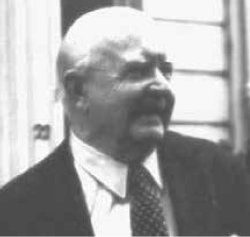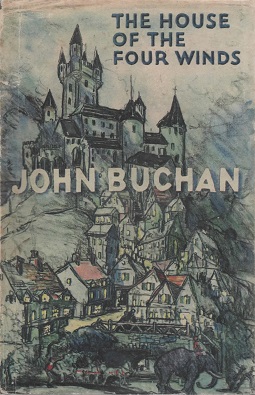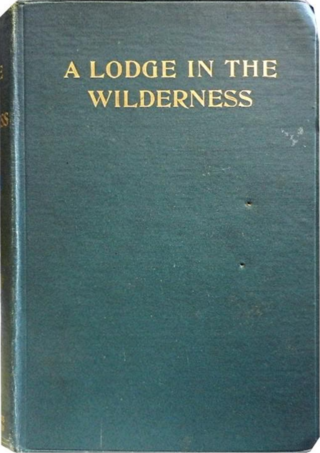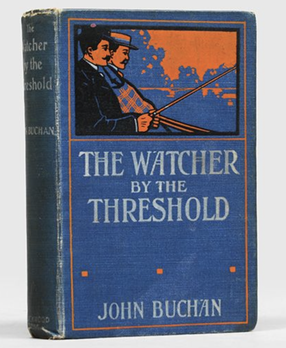
John Buchan, 1st Baron Tweedsmuir was a Scottish novelist, historian, and Unionist politician who served as Governor General of Canada, the 15th since Canadian Confederation.

Witch Wood is a 1927 novel by the Scottish author John Buchan that critics have called his masterpiece. The book is set in the Scottish Borders during the Wars of the Three Kingdoms, and combines the author's interests in landscape, 17th century Calvinism, and the fate of Scotland. A significant portion of the dialogue is in Scots.

The Island of Sheep is a 1936 novel by the Scottish author John Buchan, the last of his novels to focus on his characters Richard Hannay and Sandy Arbuthnot. It was published in the United States under the title The Man from the Norlands.

Richard Alexander Usborne was a journalist, advertising executive, schoolmaster and author. After the publication of his book Wodehouse at Work in 1961 he became regarded as the leading authority on the works of P. G. Wodehouse. He published or contributed to nine more books on the subject. He adapted eight Wodehouse novels and several other of the author's works for broadcast on BBC radio between 1979 and 1996.

Salute to Adventurers is a 1915 historical adventure novel by the Scottish author John Buchan. Largely set among the newly-settled Virginia plantations of the late 17th century, the novel includes a number of historical characters and events, including the wild and radical preaching of John Gibb, founder of the Sweet Singers sect.

The House of the Four Winds is a 1935 adventure novel by the Scots author John Buchan. It is a Ruritanian romance, and the last of his three Dickson McCunn books. The novel is set in the fictional Central European country of Evallonia and opens two years after the events recounted in Castle Gay.

The Gap in the Curtain is a 1932 borderline science fiction novel by the Scottish author John Buchan. Part of the action is autobiographical, featuring the agonies of a contemporary up-and-coming politician. It explores the theory of serial time put forward by J W Dunne: Buchan had been reading An Experiment with Time.

Huntingtower is a 1922 novel by the Scottish author John Buchan, initially serialised in Popular Magazine between August and September 1921. It is the first of his three Dickson McCunn books, the action taking place in the district of Carrick in Galloway, Scotland.

Midwinter: Certain travellers in old England is a 1923 historical novel by the Scottish author John Buchan. It is set during the Jacobite rising of 1745, when an army of Scottish highlanders seeking to place Charles Stuart onto the English throne advanced into England as far South as Derby. The Prince, otherwise known as "Bonnie Prince Charlie", the grandson of the ousted King James II, required men and money from English Jacobite sympathisers, and the novel imagines why those were not forthcoming from landowners in the Western counties and Wales. It purports to sheds light on Samuel Johnson's previously unknown activities during that period.

The Path of the King is a 1921 novel by the Scottish author John Buchan, presented as a loosely-coupled series of short stories.

Sir Quixote of the Moors: being some account of an episode in the life of the Sieur de Rohaine is an 1895 short novel by the Scottish author John Buchan. It was Buchan's first novel, written when he was nineteen and an undergraduate at Glasgow University. Buchan's original title was Sir Quixote, and he was annoyed by the addition of "of the Moors" by his publisher.

John Burnet of Barns is an 1898 novel by the Scottish author John Buchan, published when he was 23 years of age. His second novel, it had first appeared in serial form in Chambers's Journal earlier that year.

A Lost Lady of Old Years is an 1899 novel by the Scottish author John Buchan. It was first published in serial form in Today. The title comes from Browning’s poem Waring.

A Lodge in the Wilderness is a 1906 political quasi-novel by the Scottish author John Buchan.

The Blanket of the Dark is a 1931 historical novel by the Scottish author John Buchan. The novel is set in the early part of the reign of Henry VIII, and explores the possible consequences had the Tudors been overthrown by a rightful descendant of Edward III.

The Magic Walking Stick is a 1932 novel by the Scottish author John Buchan, his only novel for children. The first edition was illustrated by John Morton Sale.

The Free Fishers is a 1934 novel by the Scottish author John Buchan, his last work of historical fiction. The novel is set during the period of the Napoleonic Wars and follows the adventures of Anthony Lammas, a young professor at St Andrews, who is drawn into a plot to kill the prime minister Spencer Perceval. He is aided by The Free Fishers, a secret mutual aid organisation.

Montrose is a 1928 biography of James Graham, 1st Marquess of Montrose by the Scottish author John Buchan. It won the James Tait Black Memorial Prize for biography in 1928.

The Watcher by the Threshold, and other tales is a collection of early novellas and stories, most with supernatural elements, by the Scottish author John Buchan. When first published in the UK in 1902 the collection included five stories, mainly set in the Scottish Borders. The collection was republished for the US market in 1918 under the title The Watcher by the Threshold, with four of the original stories and four new ones.



















